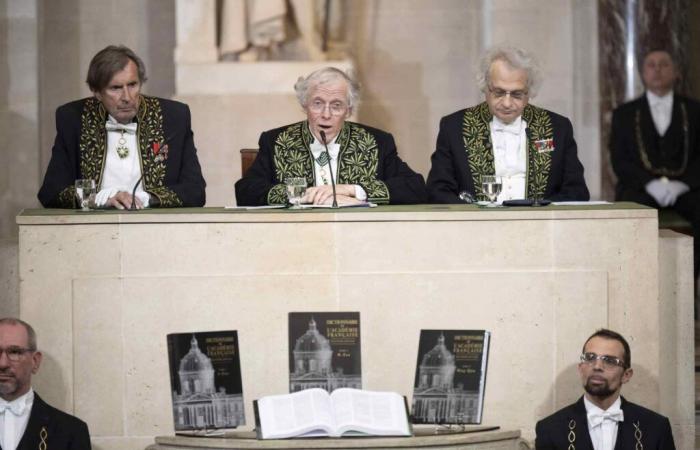The French Academy knows how to take its time. Thursday, November 14, she finally presented the fourth and final volume (going from the letters R to Z) of her dictionary of the French language… 90 years after the last official edition. The object was presented with great fanfare to Emmanuel Macron during a ceremony under the dome of the institution. And as soon as it was published, this dictionary was immediately criticized, mocked, mocked.
There’s something there. Certainly, the dictionary introduces many new words, but these are already obsolete in terms of current usage of the language. Here, for example, are some “new things”: incredible, deafening, tartempion, rewinder, thugocracy, rancard, zonard, superheroes, Taylorism or zouk. Important clarification: if the volume published this week goes from the letter R to Z, the three previous volumes, published since the end of the 1980s, have not been updated.
Inconsistencies on the feminization of words
But the great revolution of this dictionary is feminine (and not feminist). The French Academy, which has long been accused of sexist by its detractors, has finally accepted the feminization of the names of professions and official functions. For ELLE, the linguist Laélia Véron* reacts: “We could rejoice, but it has been forgotten that academics have completely hysterized the debate for years by promising us the death of the French language if we say a minister or a author. »
As a reminder, the term “author” was included in the Robert dictionary in 1996, which then triggered a media storm. “Robert was accused of ideology at that time, but in fact, the word author, from a pure lexicographic point of view, is obvious and it has naturally imposed itself since then,” notes Laélia Veron.
The one who is a lecturer in stylistics and French language at the University of Orléans also demonstrates an inconsistency on this point: “The Academy dictionary was written over 90 years. The last edition dates from 1935. As a result, there are traces of hesitation throughout the entries. Some have a modern definition, with one feminine and one masculine, but this has not been harmonized on many others. An ambassador is, for example, defined as the ambassador’s wife, which still seems very dated. »
Why creating a dictionary over the long term is not viable
Beyond this example, it is indeed this writing over the long term, in addition to a debate on the competence of the members of the institution, which poses a problem for Laélia Véron: “Already, academicians are not linguists, nor lexicographers. Some of them are writers but they are not researchers, scientists specialized in the French language. This problem of legitimacy is coupled with another, of method. This dictionary is written in alphabetical order over 90 years. Example of this absurdity: the franc is still defined as the legal monetary unit of France. Because the word starts with the letter F and it’s at the beginning of the alphabet. And so, that was done a long time ago. This dictionary is already obsolete as soon as it is released! »
The dictionary of the French Academy has 53,000 entries, written over 90 years. For comparison, the “Grand Robert” has 150,000 entries, and the “Pocket Robert” has 76,000 entries… updated every year. “What makes it possible for a dictionary, like Robert or Larousse, to be balanced and in keeping with its times is the possibility of being updated every year,” notes the linguist. When you do it every 90 years, obviously, it’s more difficult. »
*His latest work, “Betrayal and revenge: Paradoxes of the stories of class defectors”, co-written with Karine Abiven, is available from La Découverte.






